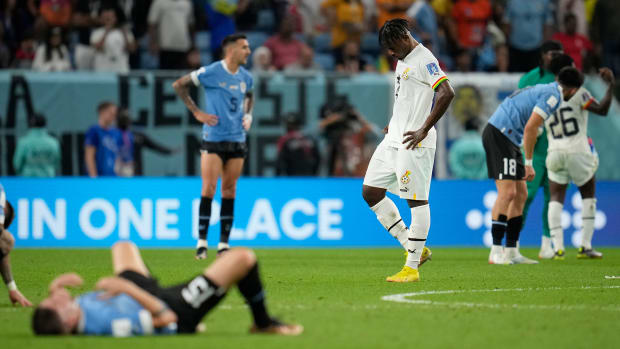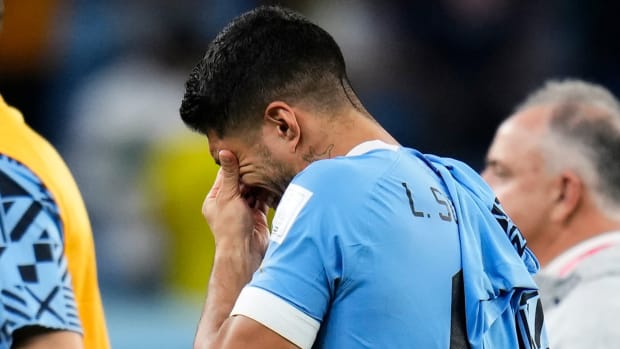AL WAKRAH, Qatar — There was to be no redemption. Not for Ghana, and certainly not for Uruguay. At the end of a frenzied game, as Luis Suárez sobbed on the bench, Uruguay’s players surrounded the German referee Daniel Siebert, raging at the non-awarding of two second-half penalties, including one in stoppage time. They had won 2–0, but it was not enough. South Korea had beaten Portugal with a dramatic stoppage-time goal from Hwang Hee-chan in the group’s simultaneous finale to take second-place on a goals-scored tiebreaker.
For 12 years, one moment has haunted Ghanaian football. What if Suárez had not clawed Dominic Adiyah’s header off the line in the last minute of extra time in the World Cup quarterfinal in South Africa in 2010? What if he had watched the ball sail over his right shoulder? What if he had misjudged it and the ball had gone in anyway? What if Asamoah Gyan had scored the subsequent penalty? Ghana would have become the first African side to reach the semifinals of the World Cup and wouldn’t have suffered the sense of loss that has gnawed at it ever since. As it was, the photo was emblazoned on billboards around Accra this week with the slogan “REVENGE! Let’s support the Black Stars.”
Suarez, in an act of magnificent chutzpah, had presented himself unapologetically at the pre-match press conference—appearing alone, not even sharing duties with his coach Diego Alonso. Faced with a furious Ghanaian journalist calling him “the devil himself” (then adding “el diablo” just in case there was any confusion) and saying that many in Ghana wanted to “retire” him, he insisted he had no regrets, pointing out it wasn’t his fault Gyan had missed the subsequent penalty. It was a consummate display from the 35-year-old, rather more assured than his 81 minutes on the pitch in the opening two group games, in which time he had managed a grand total of one shot that was not on target.

Ashley Landis/AP
Suarez had been left out of the starting lineup against Portugal, but he was never going to miss this one. With Diego Godín omitted, he was named as captain. Few sides are as good at Uruguay as sensing the emotional pressure points of a game. If there was any gesture likely to rattle Ghana, it was this.
Did Ghana play Suárez rather than the game? Perhaps. Certainly it lacked the attacking fluency it had shown against South Korea or late on against Portugal. And yet it had its chance after Sergio Rochet tripped Mohammed Kudus to concede a 21st-minute penalty. In the circumstances, there was only player who could step up—André Ayew, the only Ghana player at Al Janoub Stadium who had also played at Soccer City—and perhaps only one outcome. His penalty was weak, and easily saved by Rochet.
In that instant, the momentum shifted to Uruguay. Suárez’s half-blocked effort after 26 minutes might have been heading in anyway, but Giorgian de Arrascaeta made sure, nudging the ball over the line from close range. The same combination brought the second six minutes later, with Suárez lifting the ball over a defender for the Flamengo midfielder to volley in.
At that point, it seemed to be advantage, Uruguay. But the Korea fightback in the other match was just beginning. In the end, the crucial moment was just before the hour mark, as Daniel Amartey clumsily challenged Darwin Núñez. Siebert didn’t give a penalty and, told by VAR to check the screen, unusually stuck to his original decision, gesturing that Amartey had taken some of the ball. He had, but the question seemed rather whether he had gone through Núñez to get there. Edinson Cavani also had a good shout denied in injury time, and at the final whistle, Uruguay players raged.

Manu Fernandez/AP
They clearly felt they had been cheated, backed up by Alonso who blamed the penalty controversially awarded to Portugal in the second game for Uruguay’s exit.
“I would have liked to see this version of Uruguay before but this is what happened,” Alonso said. “I don’t have anything to say to my players: they broke their backs and gave their best selves. Everyone can see what happened in [the] previous match.”
And so, in a game that by then had become a desperate end-to-end thriller, neither side went through. For Ghana, there was disappointment, and the departure of its coach Otto Addo, who had always said he would return to his work with Borussia Dortmund after the tournament. The ghosts of Soccer City were not fully laid to rest but at least, from a Ghanaian point of view, it brought Uruguay down with them.







